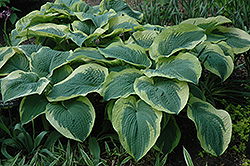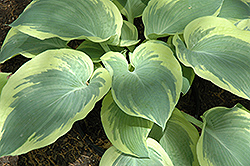3 feet
4 feet
4 feet


2a
Plantain Lily, Funkia
Northern Exposure Hosta features dainty spikes of white bell-shaped flowers rising above the foliage in mid summer. Its attractive enormous textured heart-shaped leaves remain bluish-green in color with distinctive creamy white edges throughout the season.
Northern Exposure Hosta is a dense herbaceous perennial with tall flower stalks held atop a low mound of foliage. Its wonderfully bold, coarse texture can be very effective in a balanced garden composition.
This is a relatively low maintenance plant, and is best cleaned up in early spring before it resumes active growth for the season. Gardeners should be aware of the following characteristic(s) that may warrant special consideration;
Northern Exposure Hosta is recommended for the following landscape applications;
- Accent
- Mass Planting
- General Garden Use
- Groundcover
Northern Exposure Hosta will grow to be about 3 feet tall at maturity extending to 4 feet tall with the flowers, with a spread of 4 feet. When grown in masses or used as a bedding plant, individual plants should be spaced approximately 4 feet apart. Its foliage tends to remain dense right to the ground, not requiring facer plants in front. It grows at a medium rate, and under ideal conditions can be expected to live for approximately 10 years. As an herbaceous perennial, this plant will usually die back to the crown each winter, and will regrow from the base each spring. Be careful not to disturb the crown in late winter when it may not be readily seen!
This plant does best in partial shade to shade. It prefers to grow in average to moist conditions, and shouldn't be allowed to dry out. It is not particular as to soil type or pH. It is somewhat tolerant of urban pollution. This particular variety is an interspecific hybrid. It can be propagated by division; however, as a cultivated variety, be aware that it may be subject to certain restrictions or prohibitions on propagation.














